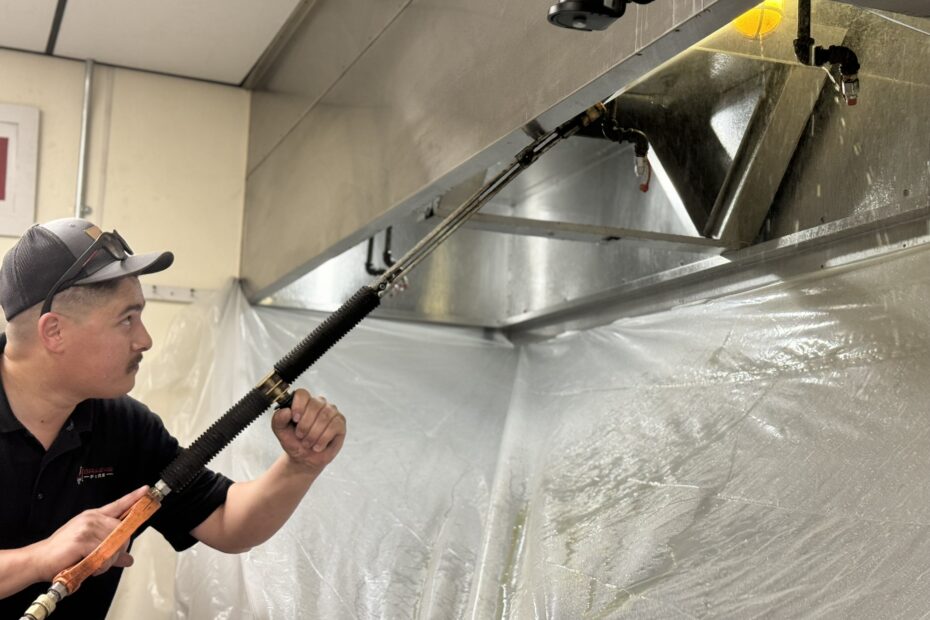Your commercial kitchen is the heart of your restaurant. It’s where the magic happens – delicious meals are crafted to delight your customers. But all that cooking can create some not-so-magical byproducts like grease, smoke, and grime.
That’s why proper kitchen hood cleaning is so critical. Don’t let dirty vents put your business at risk! Learn why consistent hood cleaning should be a top priority!
Grease Buildup is a Fire Hazard
Kitchen fires are a scary risk every restaurant operator fears. The leading cause? Built up grease in your hoods and vents. As your cooks pan fry, grill, broil, and more day after day, grease accumulates and coats the inside of the hood. Even the best range suppressant system can’t stop some build up over time. Without regular cleaning, it’s a recipe for disaster.
NFPA 96 is the fire code standard for ventilation control and fire protection of commercial cooking operations. Per the code, your kitchen hoods must be cleaned to remove grease buildup. Grease-laden vapors are highly combustible. Excess grease accumulation combined with high heat from cooking is a fire waiting to happen. Don’t let your hard work go up in smoke. Stop grease before it ignites.
Dirty Hoods Spread Germs
A hood caked in grease isn’t just a fire risk. It’s also a festering petri dish of bacteria and other microbes. When your hoods are dirty, particles can fall onto surfaces, utensils, and more. This spreads germs which lead to cross contamination. Dirty hoods can quite literally make your customers sick.
Proper cleaning sanitizes the system and removes this hazardous buildup. Routine cleaning prevents bacteria from spreading throughout your kitchen. Employee and customer health should be a top priority. Keep your restaurant safe with clean hoods.
Improve Working Conditions
Commercial cooking releases smoke, steam, and heat. Your hood vent system is designed to capture these emissions and expel them outside. But over time, buildup inside the hood and ductwork impedes air flow. This allows heat, odors, and pollutants to linger in your kitchen.
Your staff works hard in hot, fast paced conditions. Don’t make the environment even more challenging with an inefficient hood system. Thorough cleaning improves air flow so your exhaust system operates as designed. Your employees will appreciate a cooler, more comfortable work space!
Reduce Operational Costs
As ventilation becomes restricted, your hood system has to work harder to try to keep up. This means the motors and fans run longer than necessary, driving up your energy bills. The harder your equipment runs, the faster components wear out and need repair or replacement.
Additionally, as effluents aren’t properly expelled, your surfaces get dirtier faster. This means you have to spend more on cleaning supplies and labor hours for your janitorial staff. Regular hood cleaning improves system function and reduces operational expenses in multiple areas. Keep more money in your pocket with routine cleanings.
Maintain Fire Suppression System
Code requires a fire suppression system above your cooking equipment. But a dirty, greasy hood impedes spray from fire retardant nozzles. Access panels and inspection ports also get gunked up. Techs can’t properly inspect or service your critical fire equipment if it’s coated in layers of grime.
Hood cleaning provides full access to your fire suppression system. Licensed professionals can thoroughly inspect, test, and service the fire equipment after cleaning. Routine deep cleaning ensures your life saving system will function properly when needed most.
What Needs Cleaning?
Your entire ventilation system requires regular cleaning from hood to rooftop. Here are key components:
Hood
The hood contains grease baffles or filters to capture some airborne contaminants. These removable filters must be cleaned frequently. The interior liner surfaces of the hood also accumulate harmful buildup and need routine cleaning.
Ductwork
The networks of exhaust ducts directing effluents outside also grow dirty over time. Duct cleaning is an important step to keep the system clear for optimal functioning.
Fan Unit
The rooftop motorized fan assembly which pulls air also requires periodic cleaning. Grease coats the fan blades and housing, causing imbalance and insufficient exhaust.
Exhaust Vent
The exterior roof or wall cap where air exits the building should be cleaned of built up residue as well. Caustic grease eats away at materials if left to accumulate here.
How Often Should You Clean?
NFPA 96 does not mandate a defined schedule and simply requires “regular” cleaning by a qualified service. Exact frequency depends on factors like:
- Type of cooking equipment used
- Type of food cooked
- Menu size and volume
- Hours of daily operation
- Efficiency of current kitchen exhaust system
Work with a professional cleaning service to tailor a plan for your unique needs. But quarterly is a good general rule of thumb for most restaurants.
Cleaning Process Overview
Professional hood cleaning services use specialized equipment and techniques. Here is a basic overview:
- Crews properly prepare kitchen for services, covering sensitive equipment.
- Intense heated water or steam loosens tough buildup inside hoods.
- Powerful vacuums extract loosened grease from system.
- Scrubbing with degreasers on difficult residues.
- Components like filters are soaked offsite to remove all traces.
- Disinfectants and deodorizers applied to sanitize and freshen.
- Thorough inspection for any defects requiring maintenance.
- Exhaust fan and vent get same thorough scrub treatment.
- All mess cleaned up and kitchen restored for staff.
Reputable companies are fully insured, licensed, and will provide documentation of work. Services take place during off hours or temporary cooking hiatus to minimize restaurant disruption.
Final Thoughts
Regular commercial kitchen hood cleaning is so critical yet so often neglected. But the consequences pose tremendous risks – is ignoring vent maintenance worth fires or failing health inspections? Protect your business, staff, and customers by partnering with a professional cleaning service. Proper hood cleaning keeps your kitchen compliant, safe, and clean. Don’t cut corners here. Get on a regular maintenance schedule now!
